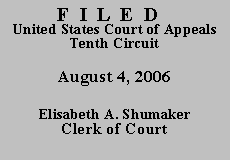

UNITED STATES OF AMERICA,
Plaintiff-Appellee,
v.
STANLEY DAYNE
SCARBOROUGH,
Defendant-Appellant.
Before KELLY, McKAY, and LUCERO, Circuit Judges.
Stanley Dayne Scarborough is a federal prisoner, appearing pro se, seeking
habeas relief pursuant to 28 U.S.C. § 2255. On September 5, 2003, during an
undercover sting in Wagoner, Oklahoma, law enforcement officers recovered
76.08 grams of cocaine base, 27.06 grams of cocaine, and more than nine grams
of methamphetamine from Mr. Scarborough's residence. He was indicted by a
federal grand jury on three counts of violating 21 U.S.C. § 841(a)(1). Mr.
Scarborough, represented by counsel, pleaded guilty to all three counts. He
subsequently filed a pro se motion to withdraw his plea, which motion was
denied after a hearing. At Mr. Scarborough's sentencing, he objected to the pre-sentence report's
recommended two-level enhancement for possessing a firearm
in relation to the underlying crime and requested a reduction of sentence for
acceptance of responsibility. The district court denied his motions and sentenced
him to 151 months' imprisonment on each count, with each count to be served
concurrently. Mr. Scarborough filed a direct appeal to question whether (1) the
district court abused its discretion by denying the motion to withdraw plea, (2)
the district court committed clear error by finding the firearm enhancement, and
(3) the district court committed clear error by refusing a reduction for acceptance
of responsibility. On appeal, we found that the district court did not abuse its
discretion by denying the motion to withdraw plea, that Mr. Scarborough was not
entitled to a reduction for acceptance of responsibility, and that the two-level
enhancement was not plain error. United States v. Scarborough, 134 Fed. Appx.
238 (10th Cir. 2005).
Mr. Scarborough, following his loss on appeal, filed this motion for resentencing under Blakely v. Washington, 542 U.S. 296 (2004), and claimed ineffective assistance of counsel.
Although Mr. Scarborough did not make a Blakely objection at sentencing, he did raise it on direct appeal. We determined that the district court's imposition of the two-level enhancement was plain error, even though Blakely had not been decided at the time of Mr. Scarborough's sentencing, but we did not find that it seriously affected his substantial rights. See Scarborough, 134 Fed. Appx. at 243. At this time, Mr. Scarborough is not entitled to relief under Blakely because his § 2255 motion is a collateral attack on his sentence. See United States v. Bellamy, 411 F.3d 1182, 1188 (10th Cir. 2005) (holding that Blakely principles do not apply retroactively to cases on collateral review).
We agree with the district court that Mr. Scarborough should have raised an ineffective assistance of trial counsel claim on direct appeal, which he did not do. This failure "to present an issue on direct appeal bars him from raising the issue in his § 2255 motion, unless he can show cause excusing his procedural default . . . or can show that a fundamental miscarriage of justice will occur if his claim is not addressed." Order, 4 (E.D. Okla. Jan. 31, 2006) (citing United States v. Warner, 23 F.3d 287, 291 (10th Cir. 1994)). He has not produced such a showing.
Mr. Scarborough also raises a claim of ineffective assistance of appellate counsel, specifically that his appellate counsel failed to submit a transcript of sentencing to the appellate court. Here, we are in accord with the district court's application of the Strickland v. Washington, 466 U.S. 668, 686 (1984), test and determine that his claim is meritless.
Mr. Scarborough now seeks from this court a certificate of appealability. The issues he raises on appeal are identical to those brought before the district court. To grant a certificate of appealability, Mr. Scarborough must make a "substantial showing of the denial of a constitutional right." 28 U.S.C. § 2253(c)(2) (1994). To meet this burden, he must demonstrate "that reasonable jurists could debate whether (or, for that matter, agree that) the petition should have been resolved in a different manner or that the issues presented were adequate to deserve encouragement to proceed further." Slack v. McDaniel, 529 U.S. 473, 484 (2000) (quotation omitted).
We have carefully reviewed the briefs of Mr. Scarborough and Appellee, the district court's disposition, and the record on appeal. Nothing in the facts, the record on appeal, or Mr. Scarborough's filing raises an issue which meets our standard for the grant of a certificate of appealability. For substantially the same reasons set forth by the district court in its Order of January 31, 2006, we cannot say "that reasonable jurists could debate whether (or, for that matter, agree that) the petition should have been resolved in a different manner." Id.
Accordingly, we DENY Mr. Scarborough's request for a certificate of appealability and DISMISS the appeal.
Entered for the Court
Monroe G. McKay
Circuit Judge